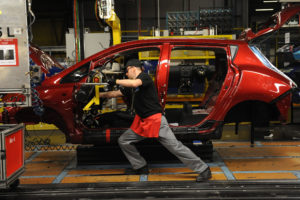
The UK car industry has hit back at government calls for business to invest more, saying that uncertainty over the rising cost of energy and a lack of progress on Brexit trade talks risked deterring spending.
Mike Hawes, chief executive of the Society of Motor Manufacturers and Traders, said the sector was being “hit hard” and that help with power bills was the “industry’s number one ask”.
Speaking to the trade body’s annual conference in London, Hawes said: “The chancellor has recently been critical of business for a lack of investment. But investment needs stability. It needs trust, not uncertainty.”
Business BriefingIn-depth analysis and comment on the latest financial and economic news.One-click sign up.
Its analysis estimates the sector’s annual energy bill will rise by £90 million in 2022, and the cost of producing vehicles and components in the UK is putting manufacturers at a competitive disadvantage, Hawes warned.
“UK electricity prices are the most expensive of any European automotive manufacturing country and 59 per cent higher than the EU average, meaning that last year UK manufacturers could have saved almost £50 million on energy costs if they were buying in the EU rather than the UK,” he said.
Hawes called for the sector to get Energy Intensive Industry status and qualify for government reliefs, and for the scale and scope of the Automotive Transformation Fund, which helps the supply chain invest in green technology, to be expanded.
Brexit uncertainties still hung over the industry, he added. “Brexit was a trauma. But it is not yet done and the effects of it are still being felt. There was an immense sense of relief when the deal was finally made.”
Yet since the signing of the Trade and Cooperation Agreement with the EU at the end of 2020 there had been little progress, he said. “The promised working groups with the EU have not met. Critical UK-specific regulation has not been hammered out … The progress promised has not materialised.
“For years business, especially automotive, operated with the uncertainty of a referendum, stalling trade negotiations, the threat of no deal. There are now uncertainties around protocols. Investors will take note. They will pause, but investments are made in a small window. They will not and cannot wait for ever.”
In a pre-recorded video message Rishi Sunak, the chancellor, told the audience of industry leaders that the sector is “incredibly important to the UK economy” and “that’s why the government is doing more to support you”. He said this included a commitment for £2.5 billion of investment since 2020 to support the transition to zero emission vehicles. The Treasury declined to comment further.
The trade body also warned that the shift to making electric vehicles put more than 22,000 UK jobs at risk. About 15 per cent of jobs in vehicle making involve making engines, exhaust systems and fuel tanks, the SMMT said.
The UK is due to phase out petrol and diesel models by 2035. New jobs will emerge and many skills will be transferable but the society said: “For many long-established component segments such as engine and exhaust producers and their sub-suppliers, the transition to electrification presents major challenges.”
Read more:
High energy bills will hit motor trade, says SMMT




